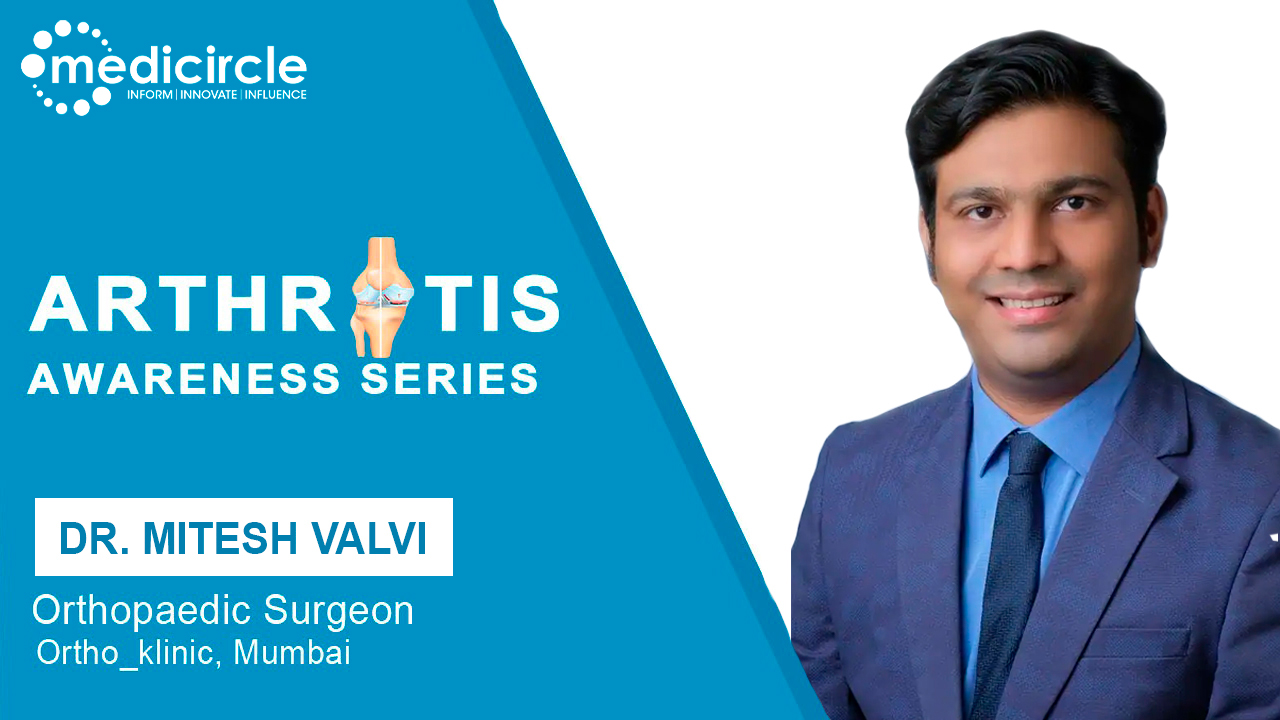Dr Mitesh Valvi is a renowned Orthopaedic in Mumbai and currently practices at Ortho_klinic, Borivali West. For the past 10 years, He has worked as an Orthopaedic Doctor and gained proficient skills and knowledge in this segment. He has pursued a degree of MBBS and MS Orthopaedic Surgeon from K J Somaiya Medical College and Research Centre. To date from 2011 he has successfully performed over 3000 surgeries including a few specialised Revision Knee and Hip replacement surgeries.
About arthritis
Dr Valvi begins, “Let me first brief you about what arthritis is. Arthritis is a condition where there is inflammation in the joint. This can be in one or more joints. Most commonly in India, we have the knee and the hip gets affected. Arthritis can be divided into 2 broad spectrums - Primary Arthritis and Secondary Arthritis.”
“Primary arthritis or osteoarthritis is a degenerative disorder which is an age-related thing. This is most commonly seen in the older age group. This is where the joint or articular cartilage (the surface that covers our bones) gets destroyed which leads to inflammation. When older people come to us that they are experiencing pain while doing routine activities, then we usually know they are patients of osteoarthritis.”
“If someone comes to us with secondary complaints like excruciating pain, then we analyse the condition further. Here not only the joints can be affected but also the tissue around it could have been affected. Then there is rheumatoid arthritis. This is a condition where the joint gets worn out. Or there could be trauma or injury to the joint. This could lead to post-traumatic osteoarthritis. This can completely destroy the joint and can occur in any age group.”
Effect of arthritis on daily life
Dr Valvi says, “People with arthritis, osteoarthritis or rheumatoid arthritis, find it very difficult to do their routine activities. If they have to travel from A to B then that causes them pain. Activities like climbing upstairs, moving legs and going out cause them pain and disrupt their routine life. These things can make the patient not go out and socialise with people. This can lead to many psychological problems for the person. Arthritis is a serious condition for which if treatments are not taken it can lead to other problems.”
Is arthritis hereditary?
Dr Valvi explains, “Arthritis is not necessarily hereditary. But conditions like osteoporotic knee and osteoporotic bone can lead to arthritis. This can be one cause that can make arthritis a hereditary condition. Even rheumatoid arthritis is not completely hereditary but it is based on certain genetic conditions. It falls under the category of an autoimmune condition. The chance of getting this disease is based on your lifestyle.”
Arthritis and swelling
Dr Valvi states, “Both arthritis, osteoarthritis or rheumatoid arthritis, can cause swelling. Because there is reactionary insulation in arthritis. So even if the tissues are healthy in osteoarthritis, if there is friction in the knee there will be the creation of debris. As the knee is a closed compartment, the debris will settle down in the pockets in the knee. This leads to a reactionary inflammation which is swelling in osteoarthritis.”
“In rheumatoid arthritis or other arthritic condition, there is inflammation of the tissue surrounding the joint. So swelling is seen in all arthritis but it is seen more in stages 3 or 4. Rheumatoid patients are always young whereas osteoarthritis patients are around the age of 50 or 60. So swelling can even be seen in 30 years old patients with rheumatoid arthritis.”
Preventive Measures for Arthritis
Dr Valvi mentions, “Osteoarthritis is a matter of concern for all of us. Other types of arthritis are not completely curable. But we can surely get down the inflammation. We can also keep the cartilage from getting destructed. The first thing we can do to prevent arthritis is lifestyle modification. A post-menopausal woman due to the hormonal changes would have weaker bones. So the only way to change this is by modifying the lifestyle.”
“Start having meals on the dining table. Use a commode. Use the lift instead of stairs. So these changes if implemented will keep your joints healthy. After a certain age, we should start taking care of such things. Another important thing is to cut down on one’s weight. Doing this alone can cut down the problems by 50%. If you are in a profession that forces you to do things multiple times, then try and stop doing it.”
“Have a good diet that is rich in calcium. Have milk products, green leafy vegetables, dry fruits and pulses. These are rich in calcium and would help you not spend more money on calcium supplements. If the bones are still not strong despite taking all these measures then see an orthopaedic surgeon.”
Don’t overdo the activities
Dr Valvi advises, “One should walk on a straight path that is not inclined or declined in its position. This will create less stress on the knee. Getting up from a seated position will put more pressure on the knee. So if your bones are not healthy then an orthopaedic surgeon would never advise you to take the stairs. Weight can be brought down by simple walking and exercise.”
“When it comes to exercises then I would recommend you to visit a physiotherapist. They are doctors that have knowledge regarding strengthing muscles and joints. They can help support and strengthen the muscles around the joint. This gives stability to the joints and makes it pain-free.”
(Edited by Priyal Shah)

 Know the prime causes that can cause arthritis in the younger and the older generation. Few changes if implemented can lower one's chance of getting this inflammatory condition.
Know the prime causes that can cause arthritis in the younger and the older generation. Few changes if implemented can lower one's chance of getting this inflammatory condition. 









.jpeg)

















.jpg)


